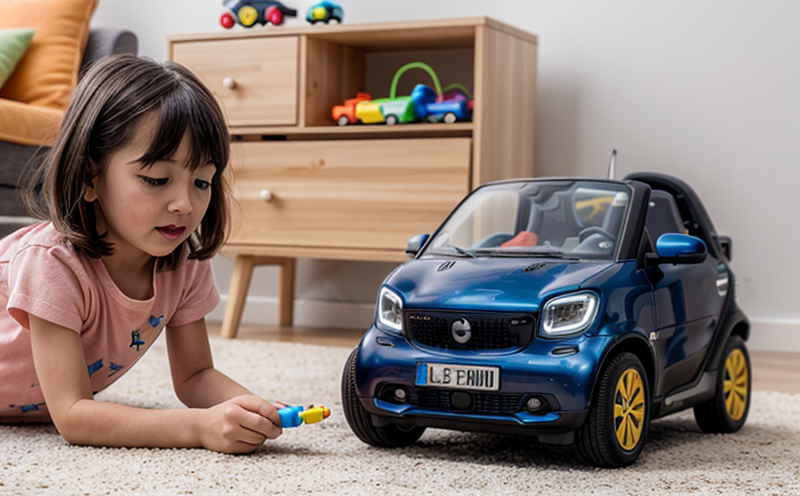ASTM F963 Electrical and Data Security for Connected Toys
The ASTM F963-18 Standard Consumer Safety Specification for Toy Safety is one of the most comprehensive standards in the toy industry. However, with the rise of smart and connected toys, a more specific standard, ASTM F963:2018 Standard Practice for Electrical and Data Security Testing of Connected Toys, has been developed to ensure that these new types of toys are safe both physically and digitally.
Connected toys have become increasingly popular due to their interactive features. These toys can connect with mobile devices, computers, or other smart home devices through Bluetooth, Wi-Fi, or Near Field Communication (NFC). However, this connectivity brings potential risks related to data privacy and security. The ASTM F963:2018 standard aims to address these concerns by providing detailed guidelines for testing the electrical safety and data integrity of connected toys.
The standard covers a wide range of tests that must be conducted on connected toys to ensure they meet the necessary requirements. These tests are designed to protect both children who play with the toys and the adults responsible for their use. The primary focus is on preventing unauthorized access, ensuring secure communication between the toy and external devices, and safeguarding personal information.
Testing these toys requires specialized equipment and expertise. Laboratories that offer this service typically have a team of experts in electrical engineering, cybersecurity, and toy safety. They use state-of-the-art instruments to perform thorough inspections and simulations under various conditions. The results are then analyzed against the requirements outlined in ASTM F963:2018.
By ensuring compliance with this standard, manufacturers can gain confidence that their products will pass rigorous testing and meet the expectations of parents and regulatory bodies worldwide. This not only enhances brand reputation but also helps protect consumers from potential hazards associated with unsafe connected toys.
Industry Applications
| Connected Toy Feature | Testing Requirements |
|---|---|
| Data Transmission | Ensure secure data transmission protocols are in place. Test for unauthorized access attempts and ensure encrypted communication. |
| Remote Control Functionality | Evaluate the safety of remote control signals to prevent interference with other electronic devices. |
| Wi-Fi Connectivity | Test for vulnerabilities in Wi-Fi connectivity that could be exploited by hackers. Ensure proper authentication methods are used. |
| Bluetooth Pairing | Check the security of Bluetooth pairing processes to prevent unauthorized connections. |
- Data Integrity: Verify that no data corruption occurs during transmission or storage.
- Password Protection: Confirm that all access points have strong password protection mechanisms in place.
Connected toys often feature advanced technologies such as Bluetooth, Wi-Fi, and NFC. These features make them prime targets for cyber attacks if not properly secured. ASTM F963 focuses on identifying potential security flaws early in the development process so they can be addressed before products reach marketplaces.
The standard also emphasizes the importance of regular updates to firmware or software used by connected toys. Manufacturers must ensure that these updates do not compromise existing security measures and instead enhance overall safety standards.
International Acceptance and Recognition
ASTM F963:2018 has gained significant recognition within the toy industry due to its rigorous testing protocols. Many countries around the world have adopted this standard as part of their national regulations for toy safety. For instance, many European Union member states use ASTM F963 when conducting inspections on imported toys.
In addition to being accepted by various governments and organizations globally, compliance with ASTM F963 often serves as a prerequisite for obtaining certifications from third-party auditors such as Underwriters Laboratories (UL) or Intertek. These independent bodies verify that companies adhere strictly to industry best practices regarding toy safety and security.
Compliance with ASTM F963 can also be beneficial during product launches, especially when targeting markets where strict regulatory requirements apply. Companies that demonstrate adherence to this standard may find it easier to enter new territories without facing additional barriers related to differing national standards.
Use Cases and Application Examples
- Educational Toys: Smart educational toys allow children to learn through interactive games. They often collect usage data which must be protected against unauthorized access.
- Social Interaction Toys: Connected dolls or teddy bears that enable children to interact with friends via video calls need secure communication channels between the toy and external devices.
The application of ASTM F963 goes beyond just ensuring physical safety; it extends into protecting sensitive information shared by users. For example, a connected doll that records voice messages from kids requires stringent measures to prevent hackers from accessing those recordings without permission.
Another key aspect addressed in ASTM F963 is the protection of personal data collected by these toys. This includes ensuring that third-party apps linked to the toy do not misuse user information. By adhering to this standard, manufacturers can build trust among consumers who are increasingly concerned about privacy issues associated with connected devices.





